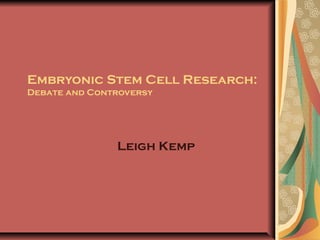Embryonic stem cell research
•Descargar como PPT, PDF•
2 recomendaciones•1,065 vistas
This document discusses embryonic stem cell research, including the science behind it, the controversy, and alternatives. It explains that embryonic stem cells are undifferentiated cells derived from embryos that can differentiate into specialized cells. While this provides potential medical benefits, it also raises ethical issues regarding the status of embryos. The document outlines perspectives from both supporters and opponents and discusses moving forward to resolve the related ethical and legal questions.
Denunciar
Compartir
Denunciar
Compartir

Recomendados
Recomendados
Más contenido relacionado
La actualidad más candente
La actualidad más candente (20)
History of animal tissue culture and natural surroundings for animal cell

History of animal tissue culture and natural surroundings for animal cell
Ethical and Social consideration of Stem Cell Research

Ethical and Social consideration of Stem Cell Research
Destacado
Destacado (20)
EXTRACTION AND CLASSIFICATION OF BLEBS IN HUMAN EMBRYONIC STEM CELL

EXTRACTION AND CLASSIFICATION OF BLEBS IN HUMAN EMBRYONIC STEM CELL
The Promise of Human Embryonic Stem Cell Therapies

The Promise of Human Embryonic Stem Cell Therapies
June 2015 stem-cell-commercialization-anna-cauldwell2

June 2015 stem-cell-commercialization-anna-cauldwell2
Презентация Томашпольского района - Проект приграничного сотрудничества Украи...

Презентация Томашпольского района - Проект приграничного сотрудничества Украи...
A Secure Software Implementation of Nonlinear Advanced Encryption Standard

A Secure Software Implementation of Nonlinear Advanced Encryption Standard
Similar a Embryonic stem cell research
Similar a Embryonic stem cell research (20)
Stem cell technology | Presented by pranjali V. Bhadane

Stem cell technology | Presented by pranjali V. Bhadane
The ISSCR is an independent, nonprofit organization providin.docx

The ISSCR is an independent, nonprofit organization providin.docx
Stem cells are biological cells found in all multicellular organisms

Stem cells are biological cells found in all multicellular organisms
Embryonic stem cell research
- 1. Embryonic Stem Cell Research: Debate and Controversy Leigh Kemp
- 2. The Science Derived from embryos Stems cells are undifferentiated, thus allowing them to be used for cell regeneration in adult patients Cell culture of preimplantation-stage embryos, which are placed in a nutrient- rich Petri dish and grown The cells divide and spread over the surface of the Petri dish
- 3. The Science The inner surface is often coated with a “feeder layer” of treated, non-dividing mouse cells Encourage growth, provide nutrients Researchers have devised ways to grow stem cells without mouse feeder cells Decreases risk of virus transfer from the cell of a mouse to human cells The stem cells are sub-cultured over a period of months, generating millions of new cells
- 4. The Science Scientists control the differentiation of these “pluripotent” (all-purpose) stem cells in more specialized types of cells Changing of the chemical composition of the “culture medium” in the Petri dish that feeds the cells Altering of the surface of the Petri dish Insertion of certain genes into the cells Stem cells differentiate into specialized cells, such as those of heart muscle, blood cells, or neurons
- 5. Controversy Ethical issues: When is an embryo or fetus considered a living person? What legal status, if any, does an embryo have? Medical or scientific issues: Are embryonic stem cells the best stem cells for medical purposes of regeneration and repair or tissue? Are there any medical risks inherent in the use of embryonic stem cells?
- 6. The Controversy: Pro Embryonic stem cells are undifferentiated, and thus can be used to restore or regenerate damaged tissue The harvesting of embryos before implantation in is not unethical – the embryos are not viable Embryos cannot feel pain Harvesting of stem cells from embryos is not murder or unethical Reprogramming of adult stem cells is inefficient, holds some risk of tumors due to DNA disruption Provides hope for the treatment of or greater understanding of Alzheimer’s disease, Parkinson’s disease, ALS, cancer, heart disease, genetic defects, and spinal cord injury
- 7. The Controversy: Neg Embryonic stem cells have not been adequately researched, and the dangers inherent in their medical use are largely unknown The harvesting of embryonic stem cells requires the death of an embryo This harvesting often requires an induced abortion; constitutes murder Where harvesting does not require induced abortion, such as excess in IVF, harvesting still requires the death of an embryo Donated embryos are in limited supply
- 8. Alternatives Stem cells derived from the bone marrow of adults can be reprogrammed to become pluripotent like embryonic stem cells Donation of adult stem cells between blood relatives Stem cells derived from amniotic fluid during amniocentesis
- 9. Moving Forward Should the Federal Government fund embryonic stem cell research? Are adult stem cells or embryonic stem cells more feasible for therapy and research purposes? Can embryonic stem cells be harvested in a humane and ethical manner? What legal rights does an embryo have?
- 10. Works Cited Bethesda, MD. "Stem Cell Basics: What Are Embryonic Stem Cells?" Stem Cell Information. The National Institutes of Health, 13 Sept. 2010. Web. 14 Nov. 2012. <http://stemcells.nih.gov/info/basics/basics3.asp>. Imperial College London. "Amniotic fluid yields alternatives to embryonic stem cells.“ ScienceDaily, 2 Jul. 2012. Web. 14 Nov. 2012. Rugnetta, Michael, and Michael Peroski. "A Life Sciences Crucible." American Progress. Center for American Progress, 16 Jan. 2009. Web. 14 Nov. 2012. <http://www.americanprogress.org/issues/technology/report/2009/01/16/5 466/a-life-sciences-crucible/>. Rugnetta, Michael, and Michael Peroski. "A Life Sciences Crucible." Center for American Progress. Center for American Progress, 16 Jan. 2009. Web. 14 Nov. 2012. <http://www.americanprogress.org/issues/technology/report/2009/01/16/5 466/a-life-sciences-crucible/>. "Timeline: A Brief History of Stem Cell Research." Science Progress. Timeline: A Brief History of Stem Cell Research, 16 Jan. 2009. Web. 14 Nov. 2012. <http://scienceprogress.org/2009/01/timeline-a-brief-history- of-stem-cell-research/>.
